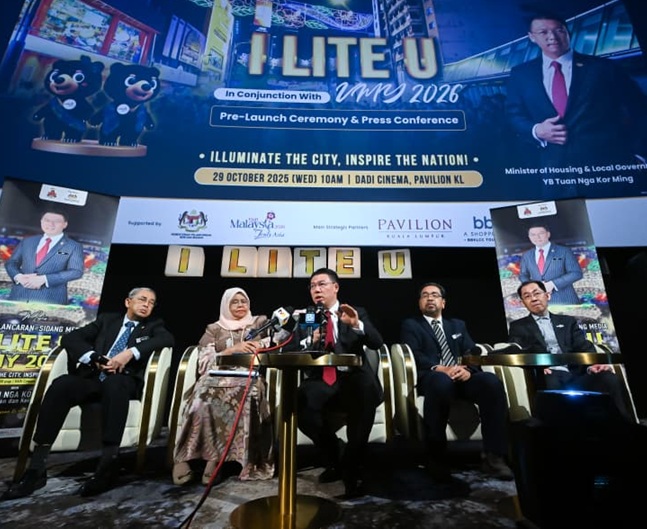
When Oversight Fails: The Malaysia Media Council’s Silence and Erosion of Press Accountability
By Dr Mohd Safar Hasim
In a democracy, silence from institutions tasked with defending press freedom is not neutrality — it is complicity.
This principle was tested on 29 October 2025, when Local Government Development Minister Nga Kor Ming publicly reprimanded a journalist from Utusan Malaysia during the pre-launch of the “I Lite U” tourism programme in Kuala Lumpur.
The journalist had asked a straightforward question: why was the programme named in English rather than Bahasa Malaysia, the national language?
Nga’s response was swift and unsettling. “I’ll remember that,” he said. “I’ll call your chief editors. I don’t want you ruining the event with such a question.” The remark, captured on video and widely circulated, was interpreted by many as a veiled threat.
It implied consequences for asking a question that challenged the optics of a government initiative. More troubling than the minister’s words, however, was the silence that followed — from the very body meant to uphold journalistic integrity in Malaysia: the Malaysia Media Council.
The Council, envisioned as an independent self-regulatory body for the media industry, has long been touted as a solution to government overreach and legal intimidation of journalists. It was meant to replace punitive laws with professional standards, to mediate disputes, and to protect the rights of reporters and editors. Yet in this moment of public intimidation — when a journalist was chastised for doing their job — the Council said nothing.
No statement was issued. No defence was mounted. No reassurance was given to the media community or the public.
This silence is not just disappointing — it is defining. It suggests that the Council, despite its lofty goals, may lack the autonomy, courage, or institutional readiness to act when it matters most. It raises questions about whether the Council is truly independent or whether it is constrained by political pressures that prevent it from fulfilling its mandate.
In the absence of a response, the burden of defending press freedom fell to civil society groups. The National Union of Journalists (NUJ) condemned Nga’s remarks as unethical and intimidating. Gerakan Media Merdeka (Geramm) called on public officials to respect the role of journalists in a democracy.
Communications Minister Fahmi Fadzil acknowledged the controversy and said Nga would meet with Utusan Malaysia to “clear the air.”
But the Council remained silent.
Why does this matter? Because silence from oversight bodies in the face of intimidation normalises threats against journalists. It undermines public trust in media institutions and signals weakness to political actors who may test boundaries further.
In Malaysia’s media landscape—where journalists already face legal risks under laws like the Sedition Act and the Communications and Multimedia Act —such silence is not just passive. It is dangerous.
The Nga Kor Ming incident is not an isolated case. It is part of a broader pattern in which journalists are pressured, threatened, or punished for asking difficult questions.
In 2025 alone, at least 79 journalists worldwide were killed while on duty, many in conflict zones or under authoritarian regimes. While Malaysia is not among the most dangerous countries for journalists, the principle remains: intimidation, even verbal, erodes the foundations of a free press.
For civic educators, strategists, and community leaders, this incident offers a teachable moment. It highlights the fragility of press freedom in Malaysia and the importance of robust, independent institutions. It also underscores the need for public pressure and civic literacy in holding both media and government accountable.
Should journalists be punished for asking uncomfortable questions? What mechanisms exist to protect them? How can communities support ethical journalism?
The Malaysia Media Council, even if not yet fully empowered by law, could have done several things. It could have issued a public statement defending the journalist’s right to ask questions. It could have reaffirmed its commitment to press freedom and called for respectful engagement between public officials and the media.
Even without enforcement powers, its voice would have mattered. Its silence, however, speaks volumes. This episode also invites reflection on the role of language and national identity in public discourse.
The journalist’s question — why use English for a government programme — was not trivial.
It touched on cultural pride, inclusivity, and the symbolic weight of Bahasa Malaysia. In reprimanding the question, Nga not only dismissed the journalist but also sidestepped a legitimate public concern.
For outreach and education, this incident can be adapted into materials that explore the role of media in democracy, the dangers of political intimidation, and the importance of institutional accountability. Families and youth in Malaysia can learn why journalists ask tough questions, why public officials must be held to account, and why silence from watchdogs affects everyone — not just the media.
The Malaysia Media Council must decide what kind of institution it wants to be. Will it be a passive observer, issuing guidelines but avoiding controversy? Or will it be a courageous defender of press freedom, willing to speak out even when it is politically inconvenient?
The answer will shape not only the future of journalism in Malaysia but also the health of its democracy.
In the meantime, civil society must remain vigilant. Journalists must continue to ask difficult questions. Educators must teach the value of a free press. And the public must demand accountability — not just from politicians, but from the institutions meant to keep them in check.
Because in the end, silence is not just deafening. It is defining.
The views expressed here are entirely those of Dr Mohd Safar Hasim, a Council Member of the Malaysian Press Institute (MPI)
WE